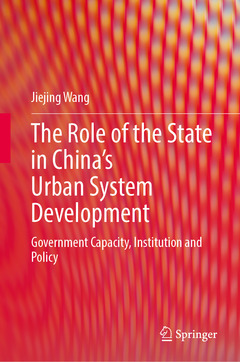The Role of the State in China's Urban System Development, 1st ed. 2021 Government Capacity, Institution and Policy
Auteur : Wang Jiejing

This book investigates how the state intervenes in the urban system in China in the post-reform period. To do so, it constructs a conceptual framework based on the perspective of political hierarchy, suggesting that the state power is hierarchically organized in China?s urban system, leading to variations in urban government capacities among cities.
The book reveals that the state has largely achieved the goal of its national urban system policy to ?strictly control the scale of large cities? resulting in the under-development of the large cities if they are mainly developing according to the market force. However, this has become less influential with the advances toward a market economy. Further, state regulation and policies have reduced the gaps between cities at the top and bottom of the urban hierarchy. The book argues that the Urban Administrative System (UAS) is an important tool for the state to regulate urban system development, and the administrative level has a significant effect on urban growth performance. It contends that China?s urban system is strongly shaped by the omnipresent state through the UAS, which hierarchically differentiates between the urban growth processes. By controlling the administrative-level upgrading process, the state can prevent the size and number of cities from increasing too rapidly.
This theoretical and empirical enquiry highlights the fact that the hierarchical power relations among cities and the resulting variations in urban government capacities are the key to understanding the role of the state in China?s urban system development in the post-reform period.
Jiejing Wang is Associate Professor in the School of Public Administration and Policy, Remin University of China, Beijing. He received his bachelor degree of engineering in urban planning and master degree of science in geography from Peking University, and he got his Ph.D. from The University of Hong Kong. His research interests focus primarily on urbanization, urban system, migration, and urban transformation in China. He has received a number of scholarly awards, including HKU Li Ka Shing Prizes (2015/2016) and Finalist of Royal Town Planning Institute (RTPI) Awards for Research Excellence (2016).
Develops a conceptual framework based on the perspective of political hierarchy to investigate how the state intervenes in the urban system in China in the post-reform period
Reveals that China’s urban system is strongly shaped by the omnipresent state through the Urban Administrative System, which hierarchically differentiates the urban growth processes
Enriches the theories on China by opening the state’s “black box” and conceptualizing the power relations between governments at different administrative levels
Date de parution : 02-2021
Ouvrage de 213 p.
15.5x23.5 cm
Disponible chez l'éditeur (délai d'approvisionnement : 15 jours).
Prix indicatif 116,04 €
Ajouter au panier